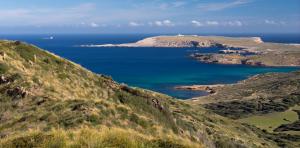
Grants
Sea
Proposal for a Participative Governance at the Isla del Aire Marine Reserve (phase 1)
13.100 € awarded
TOTAL PROJECT COST – €13.100
CLOSED
- Homegrown Project
- Project Duration: 6 months
- Area of Interest: Sea
- Other entities involved: GOB Menorca and OBSAM among other environmental organisations
LATEST UPDATES
March 2024: The result of this process, carried out in collaboration with GOB Menorca and OBSAM-IME and with the support of the Jaume Ferrer Research Institute, has been the creation of an ambitious Strategy for this area. This Strategy includes a 4-year Action Plan, and it has been structured in four areas: Knowledge as a basis for effective management; Community and Governance; Dissemination; Education and Communication; and Direction and Coordination. At the moment, we are actively seeking funds to implement the 4-year Action Plan.
THE PROJECT
Primary Impact
Preserving, protecting and regenerating natural habitats
Summary of the project
Marine Reserves are effective tools for marine conservation and provide multiple benefits but, in order to achieve their intended ecological, economic and social objectives, they require good planning, design and management, and effective monitoring. In this sense, we believe that the Isla del Aire Marine Reserve (RMIA) represents an excellent example of where to set up a participatory governance process: a platform from which to promote the need to weave networks of participation and dialogue, conflict resolution and decision-making to find the most appropriate and effective solutions in the complex management of marine protected areas.
Environmental Focus
The problem to be solved with this project is to improve the management and surveillance of the Isla del Aire marine reserve and to increase awareness of the real benefits that a Marine Reserve represents for the surrounding community (according to a study by the Marilles Foundation, for every euro invested per year in the Llevant Marine Reserve (Mallorca), a benefit of €10 was generated).
Achieving the ecological, economic and social objectives envisaged in the implementation of a Marine Reserve requires good planning, design and management, as well as effective monitoring. In the case of marine fishery reserves, which have different zonings with differentiated regulations for permitted activities, participatory processes with the different users undoubtedly improve their management and consequently their effectiveness. The recently declared Isla del Aire Marine Reserve, which is small in size, is a good example where a participatory governance process can be implemented to improve the holistic management of this reserve and its surrounding environment.
- Improvement of the management and surveillance of the Isla del Aire Marine Reserve.
- Implement adaptive management according to the environmental characteristics of the reserve, the specific benefits it provides, the needs and problems shared by users, residents, companies and public administrations present in the territory to which the reserve belongs.
In addition, this type of participatory process has been shown to increase the participants’ sense of belonging, which translates into a willingness on their part to watch over the proper functioning of the reserve, which is very appropriate for a reserve that does not have a surveillance body assigned to it.
Social, Economic and Cultural Outcomes
- Encouraging people to have a greater appreciation of the natural world and its value
- Encouraging governments, public institutions and media to act in ways that support the natural world
- Supporting businesses and their employees to better preserve, protect, and regenerate the natural world
- Encouraging changes in public/consumer behaviour to better preserve, protect, and regenerate the natural world;Reduced waste/better waste management
Description of the project
Despite the scientific knowledge that is currently available about the natural resources of the RMIA, in order to start up a participatory process it is essential to carry out a prior study that allows us to know all the neighbourhood groups and entities present in the territory as well as the economic and tourist activities that are carried out there. For this reason, the first objective of this project is the creation of a sociogram, a social and economic mapping of the territory that will serve to identify the different groups, organisations and entities that carry out some type of activity, enjoy the benefits and/or have some relationship with or influence on the Reserve. This is the basis for identifying the different actors that can weave the governance network. The RMIA belongs to the municipality of Sant Lluís and covers a very large territory made up of different urbanisations where, especially during the summer season, many activities are carried out, mainly for tourism and leisure purposes. The activities are of different natures: nautical, marine, sports, restaurants and hotels, use and management of the beaches.
Moreover, both professional and recreational fishing is a very important part of the island’s cultural tradition, as well as representing a quality resource in Menorca’s culinary culture. Likewise, the RMIA is a core area within the Marine Biosphere Reserve managed by the Menorca Biosphere Reserve Agency of the Island Council. Therefore, the entities that may have an interest in the environmental quality of this protected area are multiple and of different origins. Once the potential stakeholders in the governance project have been identified, the next step is the creation of participatory forums. The forums are spaces where, through workshops and professional mediation, the problems and needs of the different entities will be identified and where they can reach minimum agreements to improve the natural and socio-economic environment of the reserve.